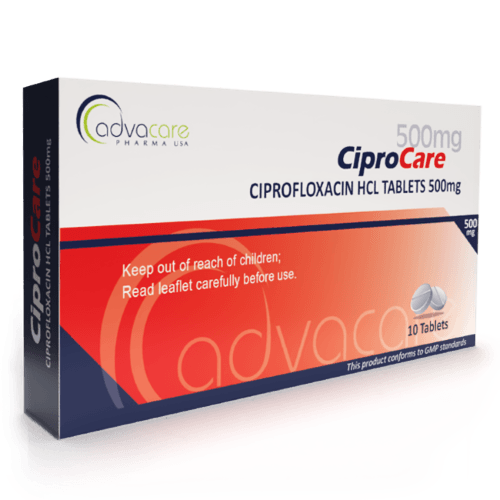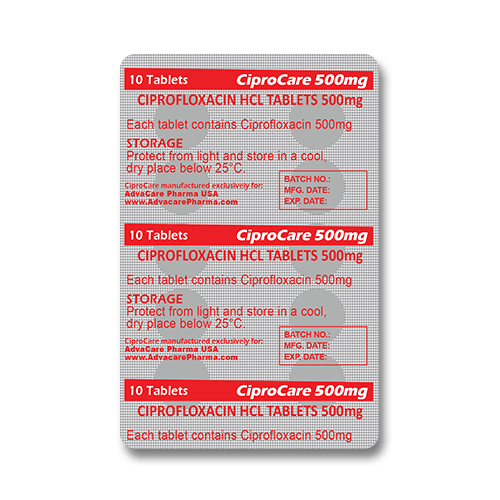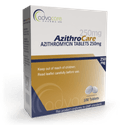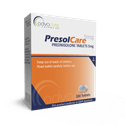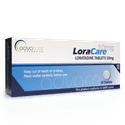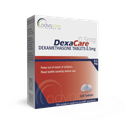- Home›
- Pharmaceuticals›
- Pharmaceutical Tablets›
- Ciprofloxacin Tablets
Ciprofloxacin Tablets
Dosage
Packaging
What is Ciprofloxacin HCl?
Active Ingredients: Ciprofloxacin HCl
Ciprofloxacin HCl Tablets are an antibiotic drug used to treat or prevent some kinds of bacterial infections, such as urinary tract infections, cystitis, prostatitis, lower respiratory tract infections, acute sinusitis, bone and joint infections, skin and skin structure, diarrhea, typhoid fever, and gonorrhea.
Ciprofloxacin can also be used as eye drops or eye ointment for the localized treatment of certain eye infections which may be caused by bacteria, such as conjunctivitis and corneal ulcers.
Ciprofloxacin is a fluoroquinolone antibiotic. The bactericidal action of ciprofloxacin results from its inhibition of the enzymes topoisomerase II (DNA gyrase) and topoisomerase IV. Ciprofloxacin prevents bacterial DNA replication by preventing DNA gyrase from supercoiling bacterial DNA, which prevents protein synthesis.
AdvaCare Pharma is a manufacturer and supplier of Ciprofloxacin HCl Tablets. We offer a wide range of high-quality and cost-effective medical supplies that are available for distribution. Our medications are produced in our GMP-certified facilities in China, India, and the USA.
Why are we a leading Ciprofloxacin manufacturer?
As a reputable Ciprofloxacin manufacturer, we are dedicated to ensuring that GMP guidelines and standards strictly apply to the manufacture of our entire range of 200+ pharmaceutical treatments in tablet dosage form.
AdvaCare Pharma is an American pharmaceutical company committed to the manufacture of high-quality, affordable pharmaceuticals for a global market. The extensive international network that we partner with includes pharmaceutical distributors, hospitals, pharmacies, and a variety of other medical institutions. Our vision is to manufacture Ciprofloxacin Tablets, and other quality-assured oral solid treatments, that get into the hands of those that need them most.
Uses
What is Ciprofloxacin HCl used for?
Ciprofloxacin is indicated for the treatment of:
- urinary tract infections (UTIs) and cystitis
- prostatitis
- lower respiratory tract infections
- acute sinusitis
- bone and joint infections
- skin and skin structure infections
- traveler's diarrhea
- typhoid fever
- sexually transmitted infections, such as gonorrhea
- kidney infections
- intra-abdominal infections
- post-exposure anthrax inhalation
- plague infection due to Yersinia pestis
Ciprofloxacin is also used to prevent meningitis following potential exposures.
How should Ciprofloxacin HCl Tablets be used?
This medication is intended to be taken orally.
Food, beverages, medications, or supplements containing magnesium, aluminum, sucralfate, iron, zinc, didanosine, or calcium should not be consumed 2 hours before or 6 hours after taking ciprofloxacin, as they can reduce its efficacy.
Drink fluids liberally for the duration of treatment to combat dehydration and potential formation of urine crystals.
If a dose is missed, it should be taken no later than 6 hours before the next scheduled dose. If it is less than 6 hours before the next dose, skip the missed dose and resume treatment as prescribed. Do not take double doses to compensate for a missed dose.
What dose should be taken and for how long?
Adults Dosage may vary based on different medical indications:
- Urinary tract infections, the recommended dose is 250-500mg twice daily for 7-14 days.
- Acute, uncomplicated cystitis, the recommended dose is 250mg twice daily for 3 days.
- Chronic bacterial prostatitis, the recommended dose is 500mg twice daily for 28 days.
- Lower respiratory tract infections, the recommended dose is 500-700mg twice daily for 7-14 days.
- Acute sinusitis, the recommended dose is 500mg twice daily for 10 days.
- Bone and joint infections, the recommended dose is 500-700mg twice daily for 4-8 weeks.
- Skin and skin structure infections, the recommended dose is 500-700mg twice daily for 7-14 days.
- Infectious diarrhea, the recommended dose is 500mg twice daily for 5-7 days.
- Typhoid fever, the recommended dose is 500mg twice daily for 10 days.
- Uncomplicated urethral and cervical infections due to gonorrhea, the recommended treatment is a single dose of 250mg.
- Complicated intra-abdominal infections, the recommended treatment is twice-daily doses of 500mg for 7 to 14 days. This is typically treated in conjunction with metronidazole.
- Inhalation of anthrax (post-exposure), the recommended dose is 500mg twice daily for 60 days. Treatment should be initiated as soon as possible after suspected or confirmed exposure.
- Plague due to Y. pestis infection, the recommended dose is 500-700mg twice daily for 14 days. Treatment should be initiated as soon as possible after suspected or confirmed exposure.
Children (0 - 17 years) Recommended dosage for children may vary based on different medical conditions:
- Complicated UTIs and pyelonephritis (kidney infection), the recommended dose is 10-20mg/kg twice daily for 10-21 days. Do not exceed 750mg per dose.
- Inhalation of anthrax (post-exposure), the recommended dose is 15mg/kg twice daily for 60 days. Treatment should be initiated as soon as possible after suspected or confirmed exposure. Do not exceed 500mg per dose.
- Plague due to Y. pestis infection, the recommended dose is 15mg/kg two to three times a day for 14 days. Treatment should be initiated as soon as possible after suspected or confirmed exposure. Do not exceed 500mg per dose.
The dosage is based on medical condition, response to treatment, age, and weight. Refer to a doctor or pharmacist for guidelines on dosage. Do not exceed what they advise.
Who can use Ciprofloxacin?
Ciprofloxacin can be administered to adults and children (0-17 years), but caution is advised for specific groups of patients.
Pregnant While human studies cannot rule out all risk, current data spanning several decades have not revealed a connection between ciprofloxacin use during pregnancy and major birth defects, miscarriage, or adverse maternal or fetal outcomes. Postmarketing studies cannot make a definitive conclusion regarding the safety of ciprofloxacin use during pregnancy. The potential benefits and risks of ciprofloxacin should be weighed when administering during pregnancy.
Nursing Ciprofloxacin is excreted in human milk. Due to the potential for serious adverse reactions in nursing infants, either nursing or ciprofloxacin should be discontinued, based on the importance of the drug to the patient. Patients should wait an additional 2 days after ciprofloxacin discontinuation before resuming nursing and monitor infants for loose or bloody stools and signs of thrush or diaper rash.
Pediatric Ciprofloxacin is indicated for the treatment and prevention of various infections in children (0-17 years) but is not considered a drug of first choice due to the increased risk of adverse joint-related reactions, such as arthropathy (arthralgia, arthritis). In cases of Y. pestis or anthrax exposure, the potential benefits may outweigh the risks.
Geriatric Studies with adults ≥ 65 years have not found differences in the safety or efficacy of ciprofloxacin use in older adults compared to younger adults. There were no differences in clinical experiences, but a greater sensitivity to medications cannot be ruled out. Caution should be exercised when prescribing ciprofloxacin to older patients, especially those on corticosteroids. Geriatric patients treated with fluoroquinolones, like ciprofloxacin, have a greater risk for developing severe tendon disorders. This risk is further increased with concomitant corticosteroid therapy. Tendinitis or tendon ruptures can involve the Achilles, hand, shoulder, or other tendons and can occur during or up to several months after therapy completion.
An increased incidence of aortic aneurysm and dissection in older patients in the months following fluoroquinolone use has been reported.
Other warnings
Ciprofloxacin is primarily eliminated by renal excretion and dosage modification is recommended in patients with severe renal dysfunction.
Photosensitivity/phototoxicity has been reported with fluoroquinolone use. Patients should minimize or avoid exposure to natural or artificial sunlight for the duration of treatment and report any sunburn-like reactions or skin eruptions.
Disabling and potentially irreversible serious adverse reactions have been associated with ciprofloxacin use. Patients should discontinue ciprofloxacin and contact their doctor immediately if they experience adverse reactions related to the following:
- Tendinitis and Tendon Rupture: The risk of severe tendon disorders associated with fluoroquinolones is elevated in patients who are older patients, taking corticosteroids, and have had a kidney, heart, or lung transplant.
- Peripheral Neuropathies: Symptom onset may begin early in therapy and may be irreversible. Symptoms related to peripheral neuropathy include pain, burning, tingling, numbness and/or weakness and usually occur in the hands and feet.
- Central Nervous System (CNS) Effects: Patients with a history of convulsions may be at an increased risk for adverse CNS effects and should notify their doctor before taking ciprofloxacin.
- Hepatotoxicity: Severe hepatotoxicity resulting in acute hepatitis and fatal events has been reported.
- Prolongation of the QT Interval: Patients with a history of QT prolongation or proarrhythmic conditions (hypokalemia, bradycardia), taking any Class IA (quinidine, procainamide), or Class III (amiodarone, sotalol) antiarrhythmic agents should notify their doctor before initiating treatment.
Side Effects
As with all pharmaceuticals, some unwanted effects can occur from the use of Ciprofloxacin HCl Tablets.
Common side effects include, but are not limited to:
- nausea
- diarrhea
- tiredness
- vaginal itching or discharge
- heartburn
Seek immediate medical attention if the following develop:
- difficulty breathing
- irregular or fast heartbeat
- sudden chest, stomach, or back pain
- loss of consciousness
- seizures
For a comprehensive understanding of all potential side effects, consult a medical professional.
If any symptoms persist or worsen, or you notice any other symptoms, please call your doctor immediately.
Precautions
Do NOT use Ciprofloxacin HCl Tablets if:
- You are allergic to any of the ingredients.
- You are allergic to quinolone antibiotics.
- You have a medical history of diabetes, heart problems, joint/tendon problems, kidney disease, liver disease, depression, or myasthenia gravis.
- You have low levels of potassium or magnesium in the blood.
Before treatment, consult your doctor regarding any medications you are taking to address potential drug interactions.
This medication may not be suitable for people with certain conditions, so it is important to consult with a doctor if you have any health conditions.
References
Efficacy and safety of ciprofloxacin treatment in urinary tract infections (UTIs) in adults: a systematic review with meta-analysis
This is a systematic review with a meta-analysis of randomized controlled trials (RCT) on the efficacy and safety of ciprofloxacin in the treatment of acute or complicated urinary tract infections in adults. Clinical cure, bacterial resistance, and adverse event rates were measured during the study.
During the research, 111 RCTs were identified, but 81 RCTs were excluded due to low-quality methodology.
The conclusion of the study is that ciprofloxacin is a safe and effective therapeutic alternative for the treatment of acute or complicated urinary tract infections in adults.

You might be interested in...
Why AdvaCare Pharma?
As an industry leader, we are aware of our responsibility to provide affordable and sustainable solutions to improve healthcare worldwide.
